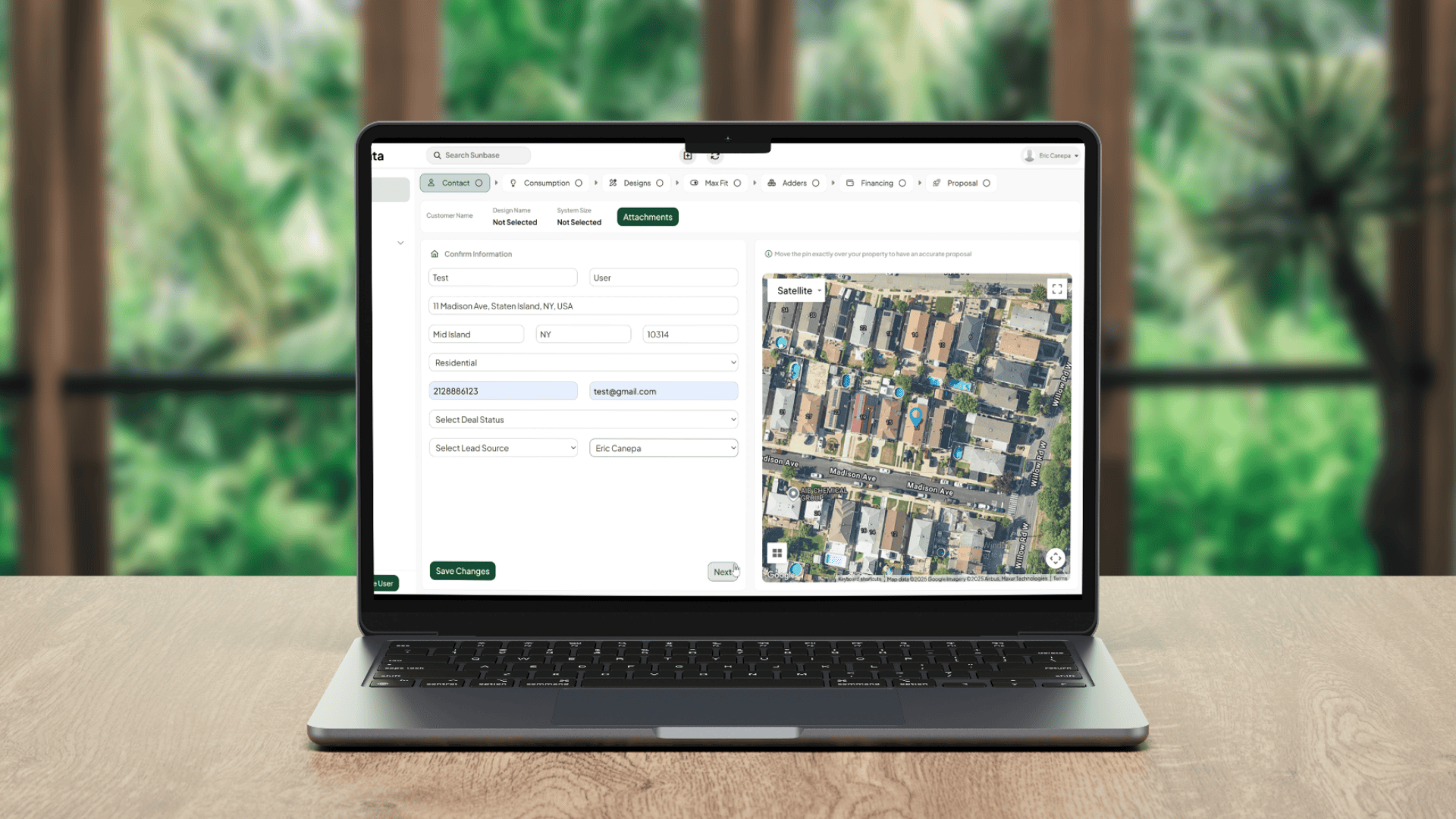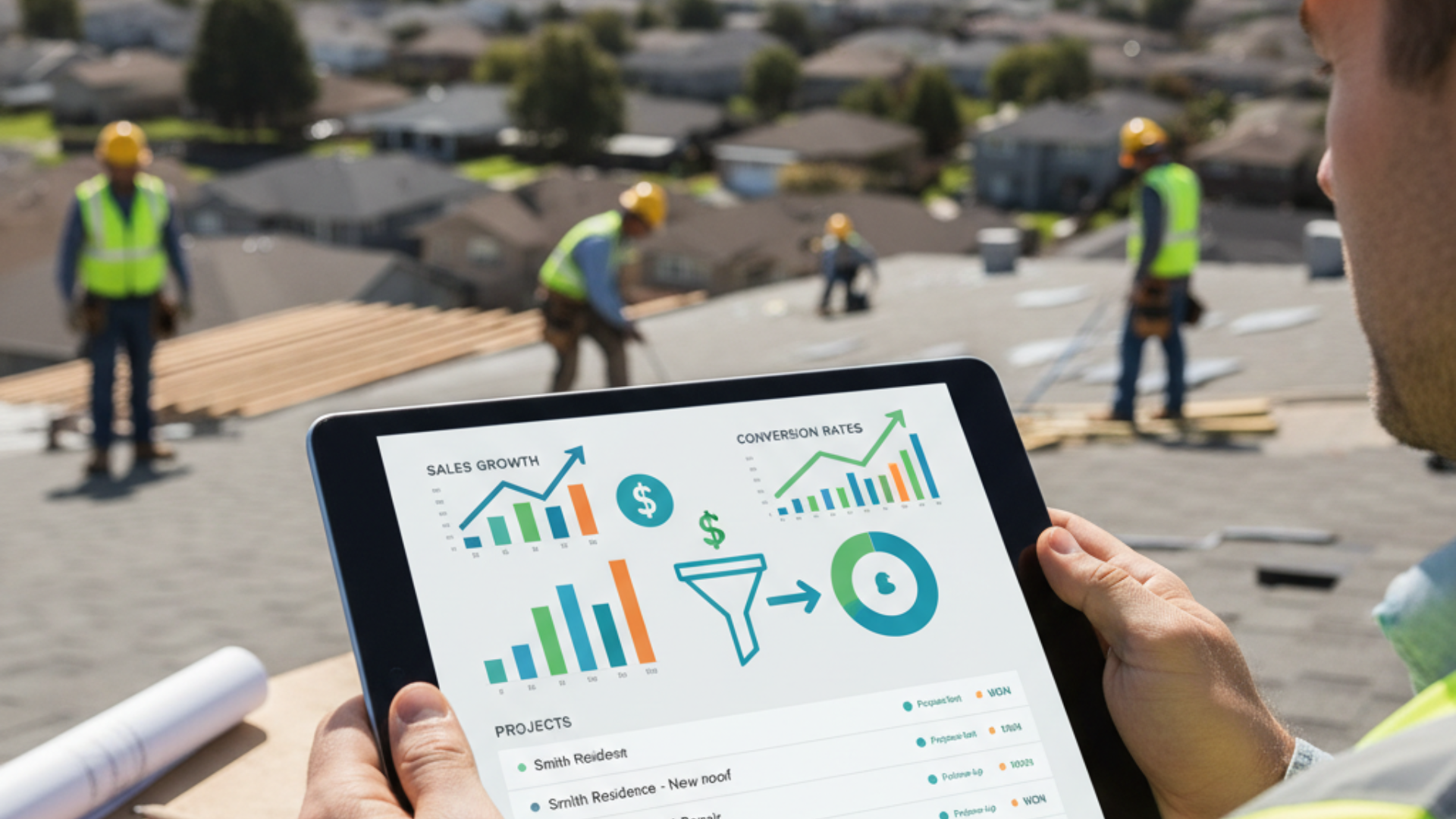April 30, 2025
The solar industry is flourishing, and with growth comes competition. For solar contractors, efficiency is essential, not optional. Every step must be simplified, from lead generation to project completion, to maximize profitability and customer satisfaction.
That’s where a Solar CRM (Customer Relationship Management) system comes in. Unlike generic CRMs,
Solar CRMs are designed specifically for solar professionals and offer purpose-built tools, such as automated lead capture, proposal management, utility bill collection, and team tracking.
When implemented effectively, a Solar CRM becomes more than just a tool; it becomes a growth engine.
This blog explores the best practices solar contractors can use to unlock the full potential of a Solar CRM and scale operations with confidence.
Key Takeaways
- Learn how to choose and customize a Solar CRM for your business.
- Streamline lead management and speed up response times with automation.
- Use CRM tools to create proposals, track projects, and boost sales.
- Build stronger customer relationships and grow your referral base.
- Use CRM data to improve collaboration, forecasting, and business decisions.
Foundational Best Practices for Solar CRM Implementation
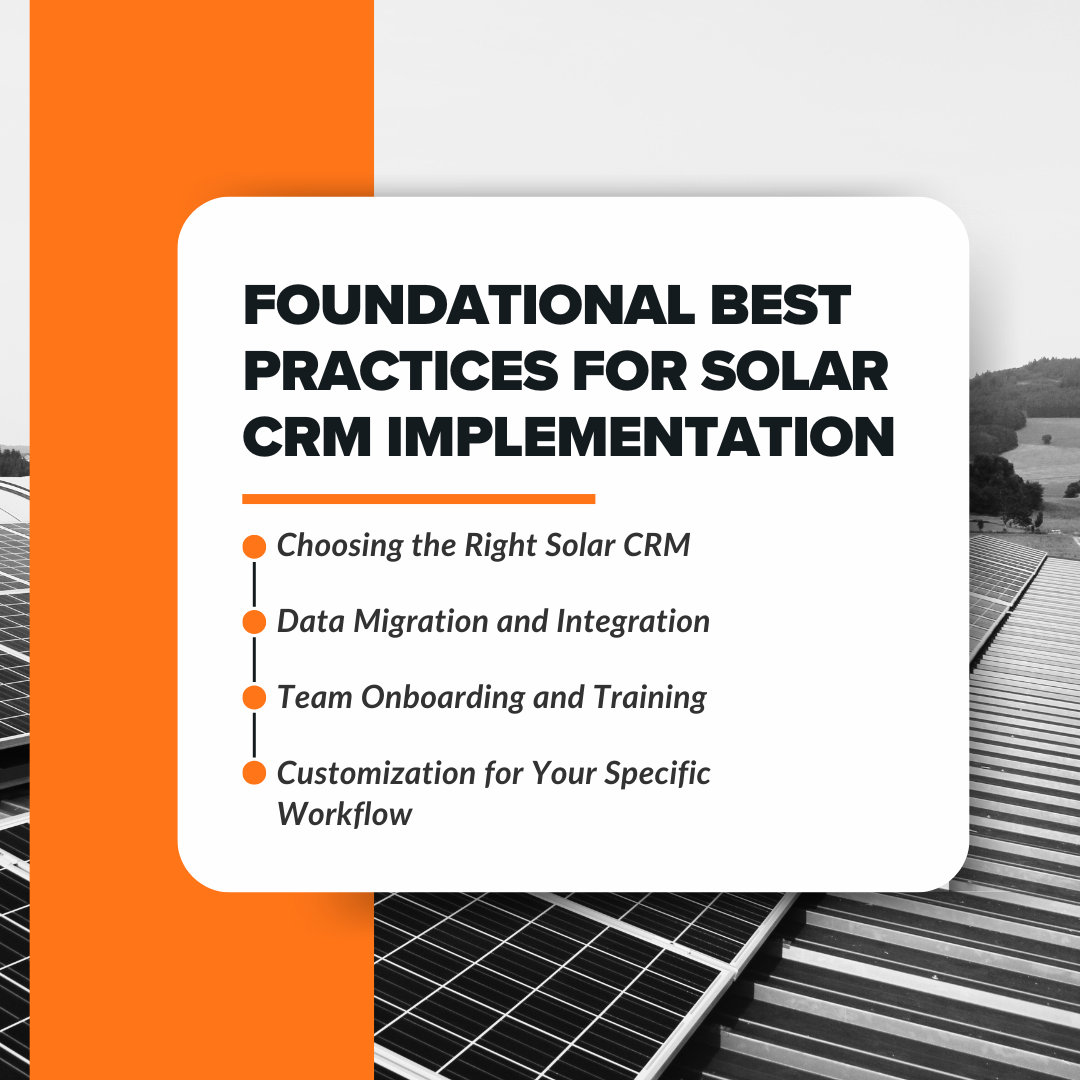
Implementing a Solar CRM isn’t merely about adopting new software—it’s about establishing the foundation for smarter, more streamlined operations throughout your entire business. To genuinely unlock its potential, you need more than just a login and a quick setup.
If you get it right from the start, your CRM will become a powerful engine driving efficiency, alignment, and growth throughout your solar operation.
1. Choosing the Right Solar CRM
Selecting the right CRM is crucial for solar companies to enhance productivity and efficiency. Opt for one designed with solar in mind—like Sunbaseor similar tools. These CRMs understand your language: kilowatt-hours, shading analysis, permitting cycles, and more.
2. Data Migration and Integration
Moving from spreadsheets or a generic CRM? Plan a structured migration. Clean your existing data, map fields accurately, and ensure your CRM integrates with accounting tools, design software, and project management platforms.
3. Team Onboarding and Training
Even the best CRM is useless if your team doesn’t know how to use it. Offer role-based training and create easy-to-follow guides for everyday tasks. Ensure your sales reps, project managers, and customer service staff are all on the same page.
A user-friendly interface is crucial for effective team onboarding and training. It allows even non-technical team members to adopt the software quickly and manage complex tasks efficiently.
4. Customization for Your Specific Workflow
Tailor the CRM to mirror your operations. Set up workflows for different project types (e.g., residential, commercial), customize email templates, and adjust status pipelines to reflect how your team sells and delivers projects.
Incorporating workflow automation can further enhance efficiency by reducing manual tasks and improving the overall customer experience.
Here's a Comprehensive Guide to Choosing the Best Solar CRM for 2025
Improving Lead Management for Faster Response Times
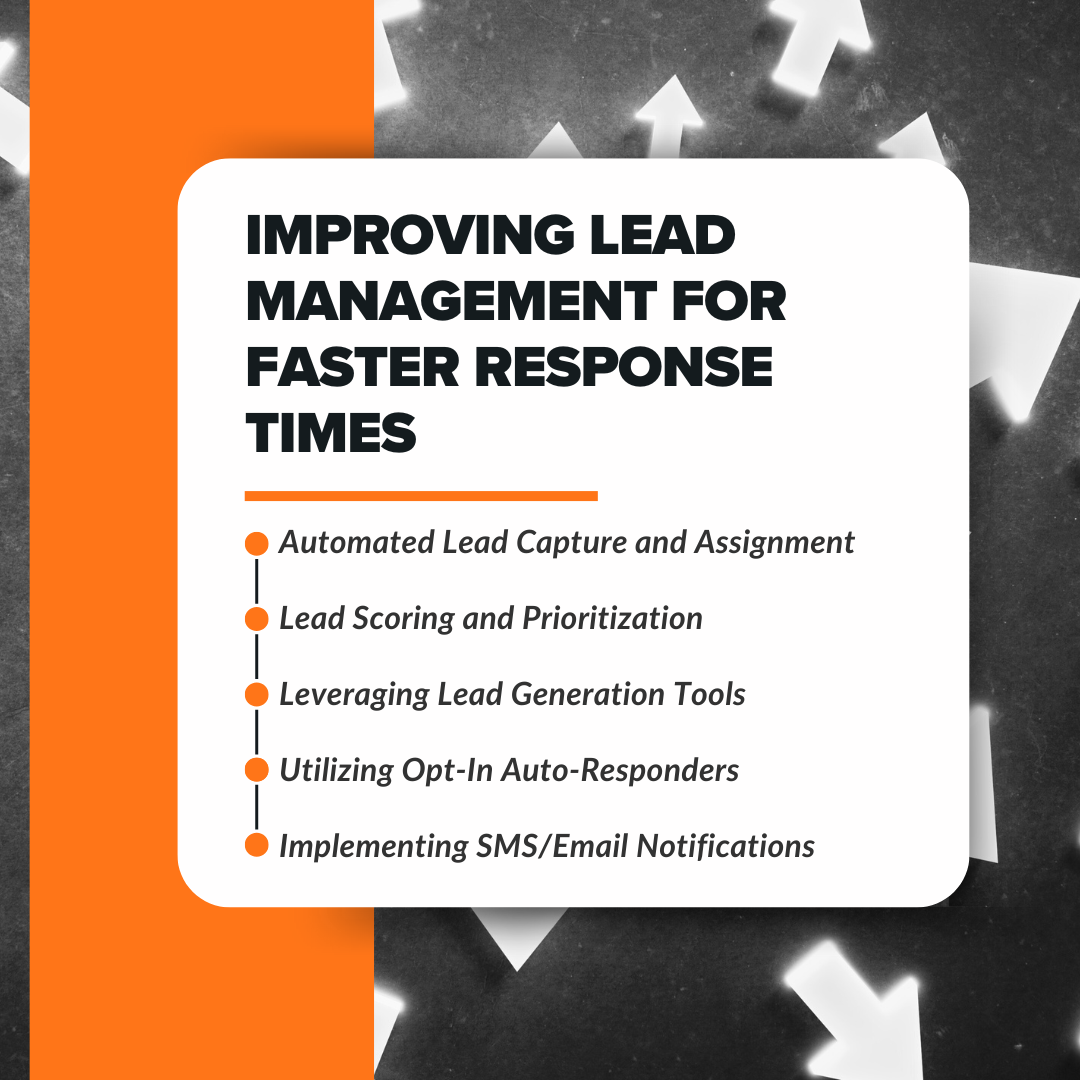
Leads are the lifeblood of any solar business, but it’s what you do after a lead comes in that truly determines your success.
If you're not following up within minutes, chances are, your competitors are. That’s why mastering lead management is crucial. With the right Solar CRM, you can automate lead capture, prioritize high-value prospects, and respond faster than ever, turning interest into action before it fades.
1. Automated Lead Capture and Assignment
Use embedded web forms on your site that push leads straight into the CRM. Set rules to auto-assign leads based on zip code, team availability, or lead source for instant engagement.
Effectively managing your sales pipeline allows you to visualize deal progress, identify high-priority leads, and automate key tasks, ultimately improving conversion rates and streamlining operations.
2. Lead Scoring and Prioritization
Leads vary in quality. Assign scores based on criteria like budget, location, or property type. This helps your team prioritize the hottest leads first, saving time and improving conversion rates.
Prioritizing high-value leads ensures that your team focuses on potential customers who are more likely to convert.
3. Leveraging Lead Generation Tools
Many Solar CRMs allow you to integrate referral programs, Facebook leads, and other ad campaigns.
Keep your CRM as the central hub for tracking which channels deliver the best return on investment (ROI).
4. Utilizing Opt-In Auto-Responders
Don’t let leads go cold. Use automated emails and SMS to greet prospects when they fill out a form,
building trust and keeping you top of mind.
Timely communication is crucial in enhancing the customer experience, ensuring that prospects feel valued and engaged from the very beginning.
5. Implementing SMS/Email Notifications
Set up instant alerts for your sales reps when a lead is assigned or when a lead takes an action, such as opening an email or requesting a quote.
This helps you strike while the iron is hot. Real-time insights are crucial for effective lead management, enabling your team to respond promptly and capitalize on opportunities.
Discover more here: Top Lead Management Strategies for Solar Sales Teams in 2025
Streamlining the Solar Sales Process for Increased Conversions
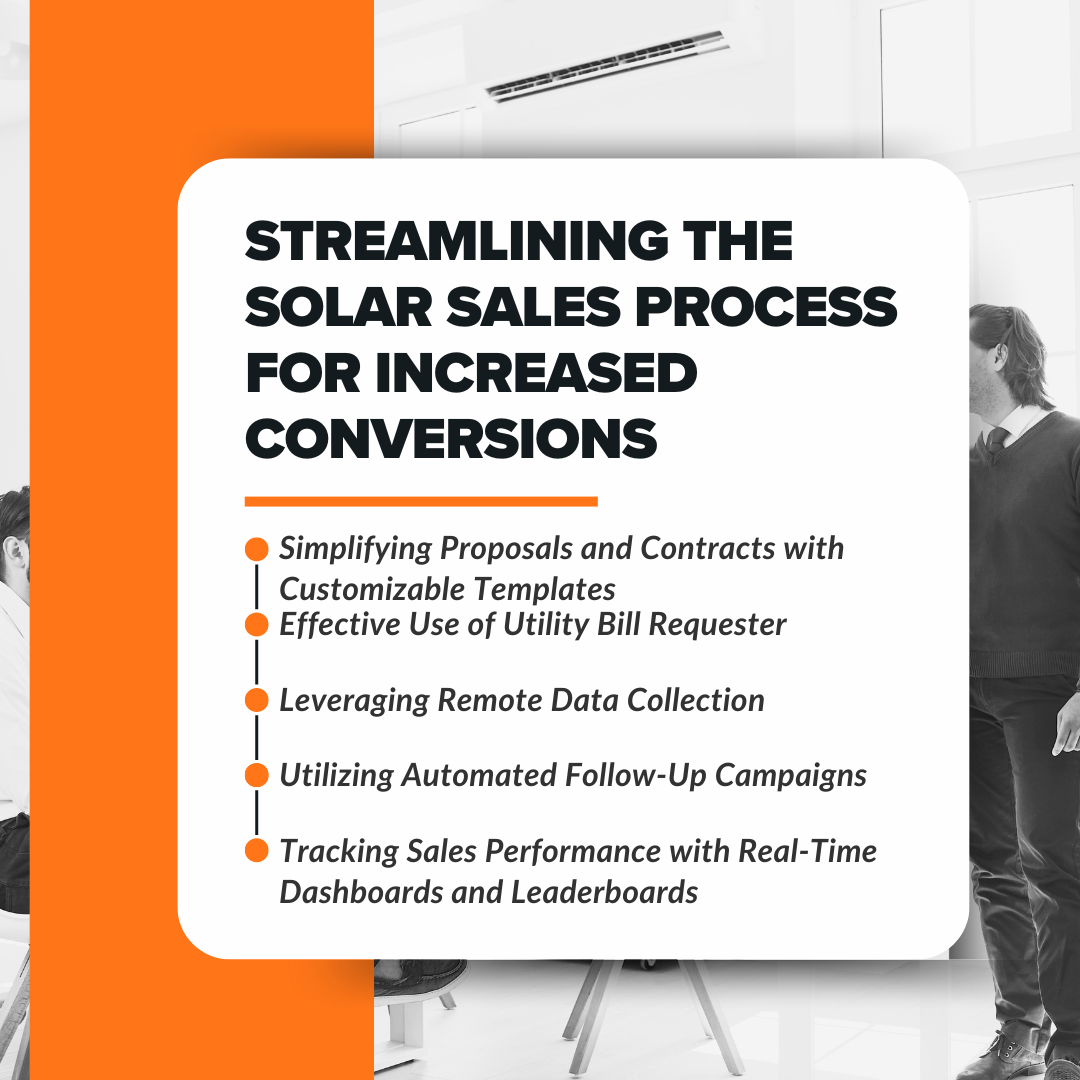
In a competitive market where every lead counts, speed and clarity in your sales process can make all the difference.
Prospects expect fast responses, clear proposals, and a smooth path from inquiry to installation.
Managing the sales funnel effectively ensures that leads are nurtured and converted efficiently.
A clunky or disorganized sales journey can cost you the deal, no matter how great your product is. That’s where a Solar CRM shines.
1. Simplifying Proposals and Contracts with Customizable Templates
Build branded, accurate proposals in minutes.
Many CRMs like Sunbase allow you to pre-fill data, such as system size, pricing, and timelines, making it easy for the sales team to quickly generate professional quotes. Additionally, effective proposal generation is crucial for swiftly creating professional proposals, simplifying processes, and enhancing productivity.
2. Effective Use of Utility Bill Requester
Need energy usage data to design a system? Send clients a simple request link from the CRM. No more back-and-forth emails or messy uploads.
Integrating financing options in customer proposals is crucial for creating professional and compelling offers, incorporating system designs and energy savings calculations.
3. Leveraging Remote Data Collection
Let customers upload photos and provide roof and site information without a site visit. This helps qualify leads faster and schedule on-site surveys more efficiently.
Efficient data collection is crucial for optimizing field operations, ensuring that teams can perform better and interact more effectively with customers.
4. Utilizing Automated Follow-Up Campaigns
Set up email sequences to keep your prospects warm. Share testimonials, financing tips, and FAQs to guide them toward signing.
Automation in these processes significantly enhances operational efficiency, streamlining business operations and boosting productivity.
5. Tracking Sales Performance with Real-Time Dashboards and Leaderboards
Monitor which reps are closing deals, where leads are dropping off, and which campaigns perform best. Use this data to tweak your strategy in real-time.
Utilizing advanced features can significantly enhance your sales pipeline management and ability to track sales performance, providing deeper analytics and extensive automation options.
Explore CRM for Solar Installers: Key Features For 2025
Enhancing Customer Relationships and Building a Referral Base
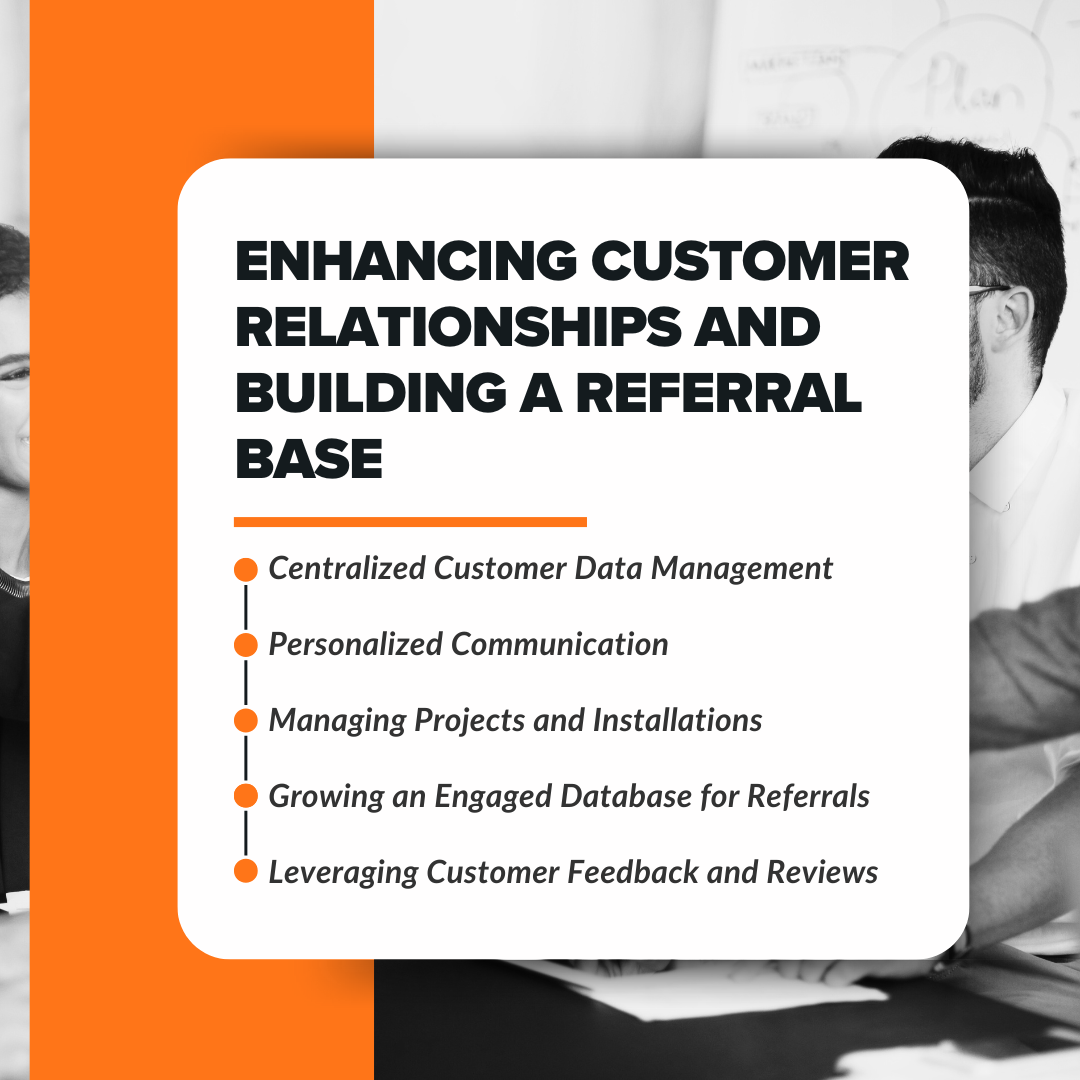
A sale doesn’t end with the installation; it marks the beginning of a long-term relationship. Happy customers are your most valuable asset. Not only do they remain loyal, but they also become powerful brand advocates.
With a well-equipped Solar CRM, you can nurture customer relationships at every stage and tap into the full potential of referrals, reviews, and repeat business. Effectively managing support requests is crucial for maintaining customer satisfaction and ensuring timely responses to inquiries.
1. Centralized Customer Data Management
Your CRM should be the single source of truth, housing contact details, quotes, project timelines, notes, and support history in one place. Centralizing all customer information in your CRM system is crucial for supporting field teams and improving overall customer service.
2. Personalized Communication
Send birthday wishes, anniversary emails, or system check-up reminders. A personal touch goes a long way in building loyalty. Personalized communication is crucial in enhancing the customer experience, making clients feel valued, and improving overall satisfaction.
3. Managing Projects and Installations
Use CRM tools to track progress from contract signing to installation and beyond. Some CRMs offer built-in project trackers and Gantt charts. Effectively tracking project progress is crucial for ensuring the timely completion of all project details.
4. Growing an Engaged Database for Referrals
Happy customers are your best salespeople. Use referral features to incentivize and track who brings in new business. Referrals are crucial as they can significantly help grow your business.
5. Leveraging Customer Feedback and Reviews
Send automatic review requests after the project is completed. Collect testimonials, increase customer communication, and address issues before they turn into negative reviews. Feedback is crucial for enhancing the customer experience.
Analyzing Data for Continuous Improvement
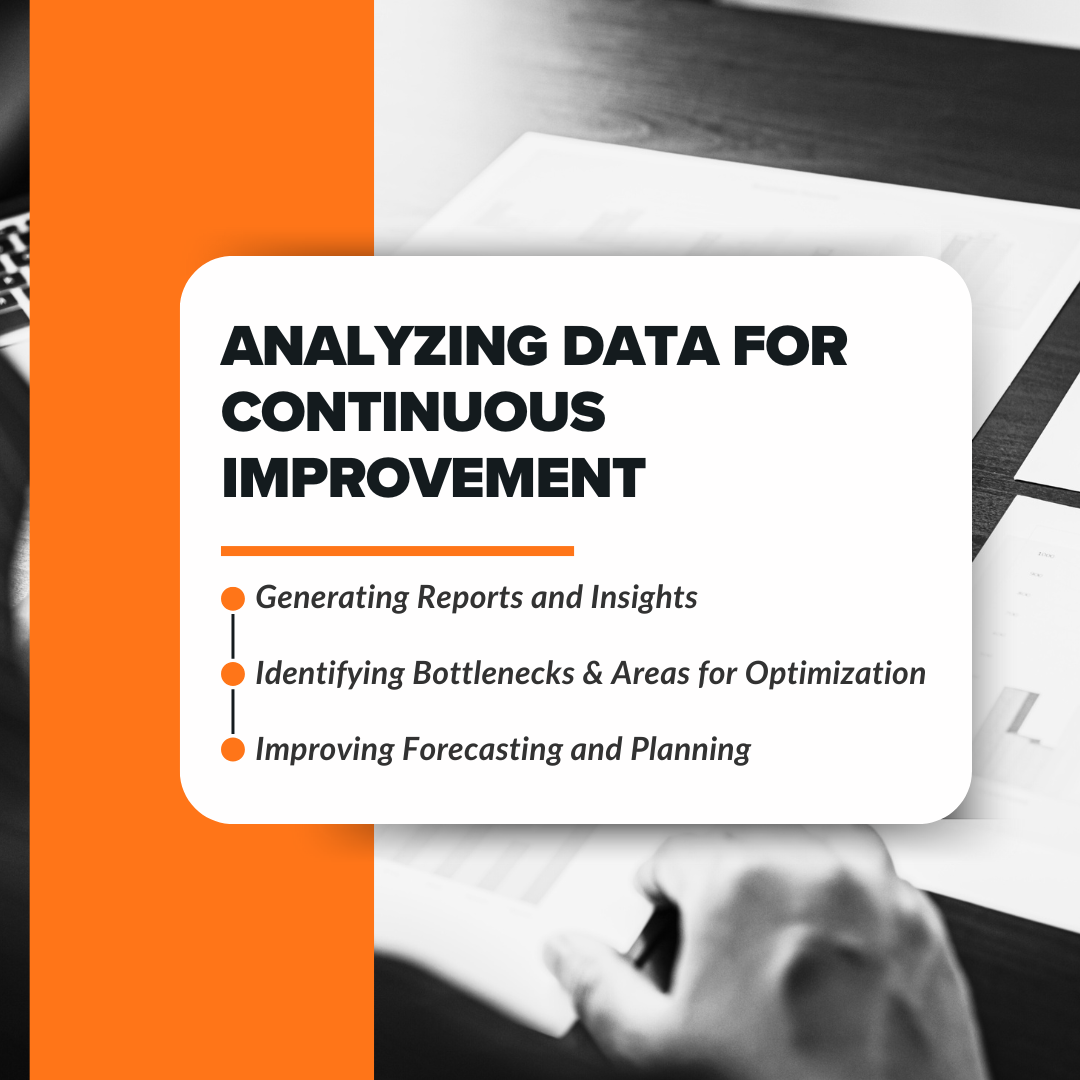
In the solar business, data isn’t just a byproduct; it’s a goldmine of insight waiting to be tapped. Every lead interaction, site visit, proposal, and installation tells a story. But without a system to analyze and act on this information, patterns go unnoticed, and opportunities slip through the cracks.
Real-time insights are crucial for making informed decisions that drive growth and efficiency.
Here's where your Solar CRM evolves from a mere tool into a crucial strategic partner.
1. Generating Reports and Insights
Run reports on close rates, revenue, lead sources, and customer satisfaction. This data is gold for improving operations.
Real-time insights are crucial for generating accurate reports, helping businesses identify growth opportunities and enhance operational efficiency.
2. Identifying Bottlenecks and Areas for Optimization
Are you losing leads after sending a proposal? Do installs take too long? Your CRM data can tell you exactly where the leaks are.
Optimizing processes for operational efficiency is crucial to streamlining business operations,
automating repetitive tasks, and enhancing team collaboration, ultimately leading to greater profitability for solar companies.
3. Improving Forecasting and Planning
Use historical data to anticipate busy seasons, plan staffing, and manage inventory or subcontractor needs in advance.
Effective forecasting and planning are crucial for growing companies to manage customer relationships and drive business growth in a competitive market.
Wrapping Up
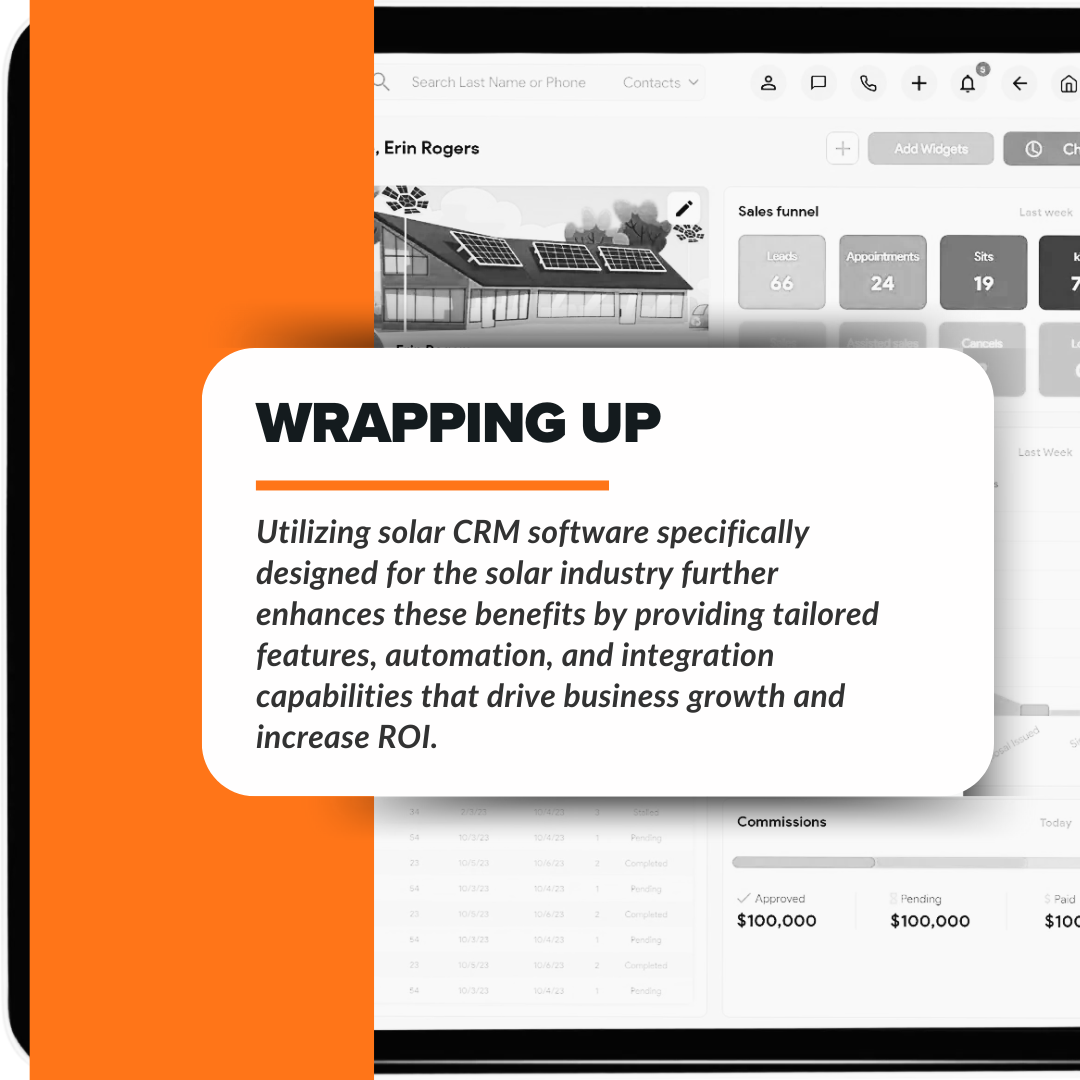
A Solar CRM touches every part of your business, from lead management and sales automation to customer care and team collaboration.
Utilizing solar CRM software specifically designed for the solar industry further enhances these benefits by providing tailored features, automation, and integration capabilities that drive business growth and increase return on investment (ROI).
Contractors using a dedicated Solar Customer Relationship Management software see faster response times, smoother project management, better team coordination, and happier customers.
Contact Sunbase
Prepared to work more efficiently instead of excessively?
Schedule a demo of Sunbase CRM today!
Frequently Asked Questions
1. What is a Solar CRM, and how is it different from a regular CRM?
A Solar CRM solution is tailored for the solar industry, unlike generic CRMs, offering specific tools like utility bill requests, solar design integrations, and remote data collection.
2. Do I really need a CRM if I’m a small solar contractor?
Yes! Even small teams benefit immensely from automation, centralization, and lead tracking. A Solar CRM helps you grow faster with fewer resources. Additionally, a CRM tailored for a small solar company can streamline operations, enhance customer interactions, and improve overall efficiency.
3. How long does it take to implement a Solar CRM?
With proper planning, most teams can fully implement and start using a CRM within 2 to 4 weeks, including data migration and training.
Selecting the right CRM is crucial for a smooth implementation. It ensures that the system aligns with your company's specific needs and features.
One Platform. Zero Chaos. Run Your Entire Business in One Place.
Sunbase replaces your CRM, proposals, scheduling, job tracking, and reporting tools — all inside one clean, connected platform.
About Sunbase
The All-In-One Platform to Run Your Entire Business
Sunbase helps you organize operations, streamline daily workflows, and manage everything - from first customer contact to final project deliver- in one connected system.
Our Mission
- Organize your business.
- Optimize your workflow.
- Automate what slows you down.
Why Businesses Choose Sunbase
One Connected Workflow
Replace scattered tools and manual processes with a single platform that brings together your team, tasks, customers, jobs, and performance data.
🌎 Global Presence
Serving the United States, Canada, India, LATAM, Australia, and 10+ international markets.
👥 11,000+ Users
Trusted by contractors, installers, project managers, sales teams, and field technicians.
🏗️ Built for All Sizes
From small contracting teams to fast-growing enterprises, Sunbase adapts to your workflow.
Useful Links For You
Stop Managing Your Business Manually. Automate It.
Sunbase automates workflows, reduces mistakes, and helps your team get more done - without hiring extra staff or juggling multiple tools.



